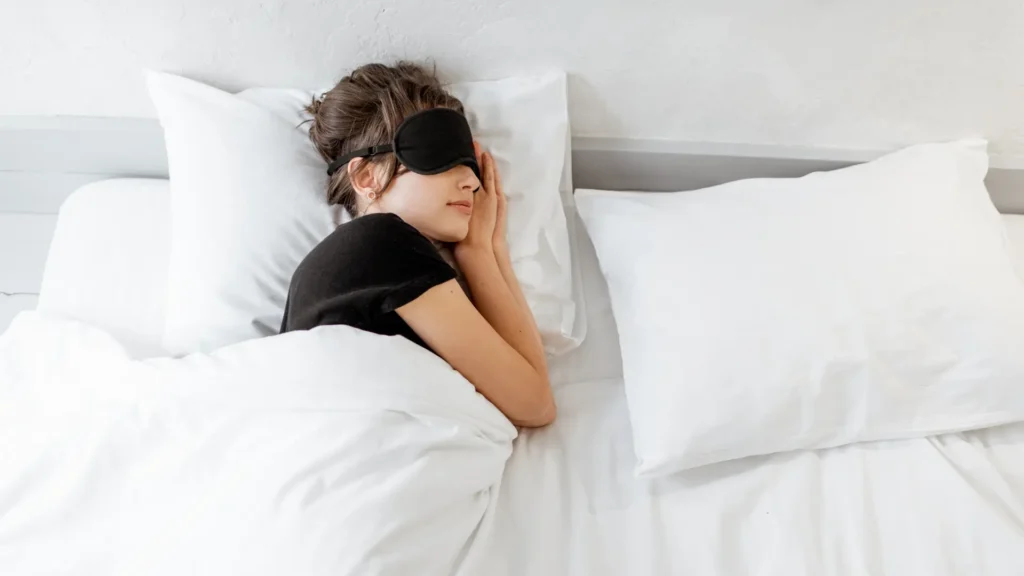A sleep diary is a detailed record of an individual’s sleeping patterns. This tool is invaluable for anyone looking to improve their sleep health. By tracking sleep, monitoring sleep habits, and documenting sleeping problems, it serves as a personal guide to uncover the mysteries of nighttime rest.
Understanding the nuances of your own slumber is the first step towards unlocking the secrets to better rest and vitality.
What are the Benefits of keeping a Sleep Diary?
A standardized sleep diary can be a powerful tool for self-monitoring and improving sleep health. When used correctly, it provides a wealth of information to help pinpoint what affects your rest. To keep an accurate and informative sleep diary, consider these practical tips:
- Be consistent: Fill out the diary every morning. This helps establish a reliable record of your sleep habits.
- Detailed entries: Include not just when you go to bed and wake up but also how long it took to fall asleep and the number of nighttime awakenings.
- Bedtime routine: Note down activities before bed such as reading or screen time, which can influence sleep quality.
- Lifestyle factors: Track your intake of caffeine, alcohol, and any medications, as well as exercise habits.
By logging these details, you gain insights into your sleep patterns and behaviors. This knowledge is instrumental in identifying causes of insomnia. For instance, a pattern of late-night snacking revealed in the sleep log may be linked to difficulties falling asleep. Addressing this through targeted interventions can lead to significant improvements in sleep quality.
Tracking bedtime routines helps you establish a consistent ritual that signals your body it’s time for rest. Documenting nighttime wakings might uncover environmental factors—like noise or light—that disrupt your sleep.
Embracing the habit of keeping a detailed sleep diary not only aids in personal understanding but also sets the stage for effective discussions with healthcare providers about your sleep health.
The Use of Sleep Diary in Insomnia Research
Sleep diaries are important tools in studying insomnia. They provide valuable information that may not be captured through other research methods. By using a consensus sleep diary, researchers can ensure that data collection is consistent across different studies.
Thus making the findings more reliable and easier to compare. These diaries allow individuals with insomnia to share their own experiences of sleep, which are known as patient-reported outcomes (PROs).
The information recorded in sleep diaries includes:
- Specific details about sleep patterns and disturbances
- How individuals perceive the quality of their sleep
- Factors that might affect sleep, such as stress or daily activities
These insights from patients are essential for a comprehensive evaluation of insomnia. They add to the objective measurements taken and help us better understand the overall sleep health of an individual, which in turn guides both diagnosis and treatment approaches.
Sleep Assessment Through Diary-Keeping
Keeping a sleep diary provides a detailed picture of how lifestyle choices impact both the duration and the quality of sleep. Key factors include:
- Caffeine Consumption Impact on Sleep: Noting the timing and amount of caffeine intake can reveal its effects on sleep latency and awakenings during the night.
- Medication Impact on Sleep: Medications may influence sleep architecture. Recording use can help pinpoint their effects on nighttime restfulness or disturbances.
- Exercise Impact on Sleep: Documenting exercise habits, such as time and intensity, allows for an analysis of their role in improving or hindering sleep quality.
By tracking these elements, individuals gain insight into personal behaviors that affect sleep patterns, enabling informed adjustments to enhance rest.
What are some Examples of Sleep Diary Formats?
Choosing the right format for a sleep diary can enhance its effectiveness. Here are some popular options:
1. Digital Sleep Diary Apps
These apps simplify data entry with intuitive interfaces. Users can quickly log sleep details on their smartphones or devices, making it easy to keep consistent records.
2. Printable Sleep Diary Templates
For those who prefer writing, printable templates offer a hands-on approach. They can be adjusted to fit individual needs and provide a physical copy of sleep patterns.
3. Online Sleep Diary Tools
Advanced features like data analysis and trend tracking are benefits of online tools. Users can also share their sleep information with healthcare providers, streamlining communication for better care.
Are Sleep Diaries Accurate?
The accuracy of sleep diaries depends on how consistently and carefully individuals record their sleep patterns and habits. When filled out thoughtfully and accurately, a sleep diary can provide a reliable overview of someone’s sleeping habits.
However, there are factors that can affect the accuracy of sleep diaries:
- Human error: Forgetting to note down certain details or not accurately assessing the quality of sleep can distort the information recorded in the diary.
- Subjectivity: Different people may have different perceptions of what constitutes a good night’s sleep.
While these factors can potentially limit the accuracy of sleep diaries, there are ways to address them:
- Using objective measures alongside the diary: Sleep tracking devices can offer additional information about sleep stages, wake times, and other variables that may be difficult for individuals to track accurately on their own.
- Combining a sleep tracking device with a well-maintained diary: This approach allows subjective feelings about sleep quality to be compared with objective data from the tracking device, providing a more comprehensive understanding of one’s sleep patterns.
By being mindful when recording information and utilizing supplementary tools like sleep trackers, potential inaccuracies in sleep diaries can be minimized. This makes them an effective and valuable tool for gaining insights into our sleep habits.
How do I fill in a Sleep Diary?
Writing in a sleep diary involves noting down specific details about your sleep habits and patterns. Here’s what you should include:
- Time to Bed and Wake Up: Jot down the exact time you climb into bed and the moment you get up. This helps track the duration spent in bed and can reveal patterns or changes over time.
- Pre-Bedtime Events: Write about important activities or events that happen before you go to sleep. This could include late-night meals, exercise, screen time, stressful conversations, or relaxation practices. These notes can uncover how evening activities affect your ability to fall asleep or stay asleep.
- Sleep Quality Assessment: Reflect on how restful your sleep was. Record how often you woke up during the night and any difficulties you had falling back asleep. This information is key to understanding disruptions that impact sleep quality.
By maintaining these records, patterns may start to emerge. For instance, you might notice that caffeine in the afternoon correlates with taking longer to fall asleep, or that screen time before bed leads to more frequent awakenings. Writing these observations down can be pivotal in making lasting changes for better sleep health.
How can I use a Sleep Diary to Improve/Address Other Sleep Issues?
A sleep diary can help you improve your sleep habits by giving you a detailed look at your nighttime routine. It shows you both the good and the bad parts of how you sleep.
Here are some ways a sleep diary can help:
- Identifying areas of improvement: By keeping track of things like your bedtime routine, how long it takes you to fall asleep, and how often you wake up during the night, you can start to see patterns. These patterns can give you clues about changes you can make to get better sleep.
- Addressing common issues: Your sleep diary might show that certain things in your environment or your behavior are affecting your sleep. For example, you might notice that changes in room temperature make it harder for you to sleep comfortably, or that using screens late at night messes up your sleep schedule.
Improving your sleep is a process. A sleep diary gives you useful information that can help you make better choices along the way, so you can actually turn your intentions into actions and get better sleep.
How can I use a Sleep Diary to Diagnose and Treat Sleep Disorders?
Sleep diaries are valuable tools for healthcare professionals to accurately diagnose and treat sleep disorders. By recording their sleep patterns and behaviors, patients can provide essential information that helps in:
- Identifying irregular sleep patterns: Sleep diaries help in spotting recurring episodes of restless nights.
- Ensuring precise treatment: Detailed records enable tailored interventions to improve sleep quality.
- Tracking sleep debt: Patterns of insufficient sleep over time can be revealed, aiding in understanding the extent of sleep debt.
By offering insights into a patient’s nightly experiences, these logs become a cornerstone in formulating effective treatment strategies and managing sleep-related issues effectively.
Why not just use a Sleep Tracker?
So why not just use a Sleep Tracker? It basically serves the same function as a Sleep Diary and is much more convenient?
The first thing would be simply that Sleep Trackers have more cost involved. This serves as a barrier of entry of sorts. Especially if people are not sure if they want to track their sleep in the first place. You most likely would need a smart watch or similar device that could cost hundreds.
Not to mention the Sleep Tracker apps themselves mostly require a monthly subscription. These costs do add up. A Sleep Diary template can be found for a few dollars on Etsy or Amazon. It makes it much easier to trial something out before deciding to commit to it.
Some other concerns with Sleep Trackers are the accuracy and customization of the data gathered. Those concerns come because they have not been tested as much. As compared to a Sleep Diary that has been tried and is more proven over time. Of course those concerns will depend from device to device and app to app.
Sleep Diaries overall are much more simple, cheaper and easier to get into for someone who is unsure if they want to commit to tracking their sleep.
Conclusion

A sleep diary is a crucial tool for both individuals and healthcare providers in the pursuit of better sleep health. By consistently recording our nighttime habits, we can better understand our own sleep patterns and behaviors.
The significance of a sleep diary cannot be emphasized enough, as it equips us with the information needed to develop effective sleep techniques and routines.
Whether utilized to tackle particular sleep issues or promote overall wellness, maintaining a sleep diary demonstrates our continuous dedication to enhancing the quality of our rest and, consequently, the quality of our lives.



